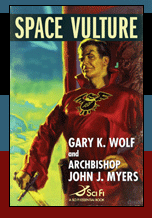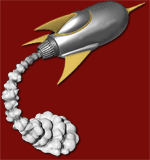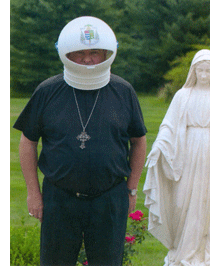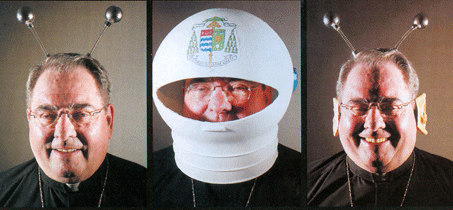 |

|
|||||
Inside JerseySci Fi with a Touch of the Divine
John J. Myers, the spiritual leader of 1.3 million Catholics, a man who wears well the stateliness of his high church office, who goes through life addressed as "Your Excellency," who is revered in Catholic circles as a canon lawyer and a proud, conservative rock of his church, is, at this moment, speaking through the face hole of a costume space helmet he has donned at the request of his guests. In a few minutes, standing in the grassy yard of his summer residence in Hunterdon County, he will even don pointy Spock ears and a pair of alien antennae. The bespectacled archbishop is doing this to promote and discuss a fun and uncanonic part of his life -- his love of science fiction and, specifically, Space Vulture, a sci-fi novel he published in March with childhood friend Gary Wolf, who decades ago went off to his own kind of fame as a novelist and creative mind behind long-eared 'toon Roger Rabbit. Their book, a fastpaced 333-page tale of intergalactic fantasy, is colored with invented species (lizardos, bulbos and Bictosian arthropods) and fictional planets (Verlinap and Medusker) that provide the setting for a heroic marshal, Victor Corsaire, to team up with a widow, her two sons and a con man to battle the notorious Space Vulture. "Obviously it's an image-changer," said Myers, who is better known for writing pastoral letters against abortion. "People think of archbishops as always super- serious, and all the burdens-of the- world type stuff. The fact that we could come up with stuff like that just is not what people would expect." It's hard to argue with John J. Myers. He is being a good sport. Now, the space helmet is off, the Spock ears and antennae are on, the camera is clicking, and the photographer, taking these things seriously as photographers are paid to do, is pondering the scene. "I'm going to try a couple without the ears," he says. "With the antennae." The archbishop obliges, with the same type of aplomb that impressed Wolf six years ago when the pair decided to write the book. "I had a number of conversations with him," Wolf recalled. " 'Are you sure you really want to this?' Because writing a book like this ... for John, this could've been a career-ender. John could have opened himself up for horrendous criticism for doing this, both in the lay Catholic community and certainly in the Catholic hierarchy. 'I asked John, 'What's the pope going to say when this comes out?' John said, 'I don't know. I guess we'll find out.' " For those who have followed his tenure in New Jersey from afar, Myers' smooth launch into science fiction seems out of character. The archbishop, while possessing a comfortable manner in small settings, often has a stiff demeanor in large ones. He sent uneasy ripples through the archdiocese soon after his 2001 arrival when he banned eulogies from Catholic funeral masses. It didn't help that his predecessor, Archbishop Theodore McCarrick, is a natural raconteur, the perfect master of ceremonies, and that Myers enjoys taking a teacher's tone to rank-and-file Catholics. To Wolf, who avoids organized religion himself but said he adheres to tenets of Christianity and Buddhism, the notion of Myers as aloof is ludicrous. He shared books and played football with Myers as a child in Earlville, Ill., and has talked with him on the phone for countless hours. "I've heard that he was viewed as an ultra-conservative, that he was the guy who was very stern, who was going to come in and make a lot of arbitrary changes and wasn't a people person," Wolf said. "I laugh when I hear that." Stern? The men had bonded as children over a pulpy sci-fi novel called Space Hawk, which decades later became the joke inspiration for Space Vulture. As adults they re-read Space Hawk, decided it was actually terrible, and vowed to refine it while paying homage to the campy science fiction genre they and other children have loved so much. So the friends were not shooting for groundbreaking literature here. Indeed, some of the dialogue seems better fit for comic book word balloons. ("How dare you?" the female lead scolds Space Vulture, upon hearing of his human chattel. "That violates human dignity. You horrible, evil man!") This was intentional, Myers said: "Pulp science fiction, just as pulp westerns, are not great art. And we knew that. But it can be fun. ... This won't be a classic. We didn't write it with that in mind." As you'd expect, Space Vuture doesn't resemble -- not in the slightest -- anything on Myers' official resume, which lists esoteric commentaries with titles like "The Trullan Controversy: Implications for the Status of Orthodox Christians in Roman Catholic Law," and "The Diocesan Fiscal Officer and the Diocesan Finance Council." In fact, Space Vulture has many more gruesome scenes about flesh eating creatures and segmented insectoids -- Wolf wrote those, the authors say -- than identifiably Catholic moral lessons. The closest it comes to pushing controversial Catholic views seems to be when the hero, Corsaire, talks with an extremely troubled alien who wants Corsaire to shoot him dead. (Spoiler hint: The church opposes euthanasia.)
That's not to say the Newark archbishop didn't add any spirituality to the pages. He did so, he said, to scenes with the widow (Cali), her sons and the con man. "Science fiction tends to be atheistic, or not to refer to creators or higher beings," Myers said. "I enjoyed getting some lines in there on how Cali prays when she's in trouble, and how the boys knew their dad was in a better place. These are things that indicate a higher being without it being explicitly Catholic." His favorite part of the plot, he said, involves the character change in Gil Terry, the aforementioned con man, who has had his human body parts replaced with insect segments for failure to pay a debt. Terry undergoes a redemption of sorts, "from being a scalawag, as my mother would say, to being a nice guy in his relationship with the boys," Myers said. Unfortunately, at least for readers looking for what might lurk in the inner depths of the archbishop's mind, neither author said he could recall much about who came up with what. Myers said Wolf did most of the writing, and that he pitched in with plot, themes and character development. Wolf remembered that at one point, "John was talking about how neat it would be to have some really horrific kind of space alien. He didn't come up with the flesh-eating monster, but John was the one who got me thinking in that direction.... We both had a really good time with that one." The book has sold decently, according to the publisher, though its Amazon.com ranking is low. Reader reviews online are almost all positive. Myers said he plans to use his share of money from the book deal, probably tens of thousands of dollars, for college funds for his nieces and nephews. The publisher, Tor Books, loved the idea of promoting a book written by an archbishop and a 'toon creator. And in what somehow seems fitting for this eclectic project, the editor was a guy named Moshe. That's Moshe Feder, who enjoyed editing a Catholic honcho almost as much as Myers enjoyed writing the book. "There's a slight incongruity: 'Moshe Feder, graduate of yeshiva for 12 years, editing the archbishop,' " Feder joked. "It's like if I went to Notre Dame and was editing a famous rabbi." Pope Benedict XVI has been predictably silent on "Space Vulture". The closest thing to a response from Rome? A Jesuit astronomer at the Vatican Observatory, quoted on the book jacket, called the book a "rollicking good time with a spice of high camp and a moral underpinning far more sophisticated than the original space operas were ever capable of attaining. — Jeff Diamant |
|||||
| The Book | The Story | The Characters | Two Boys | The Authors | The Origin | New Pulp Traditions Articles | Reviews | The Sonic Room | Purchase | Contact Us © 2007-2011 Gary K. Wolf and Archbishop John J. Myers. All rights reserved. Privacy Policy |

 "You have to admit, I'm being a good sport about this," says the archbishop of Newark.
"You have to admit, I'm being a good sport about this," says the archbishop of Newark.